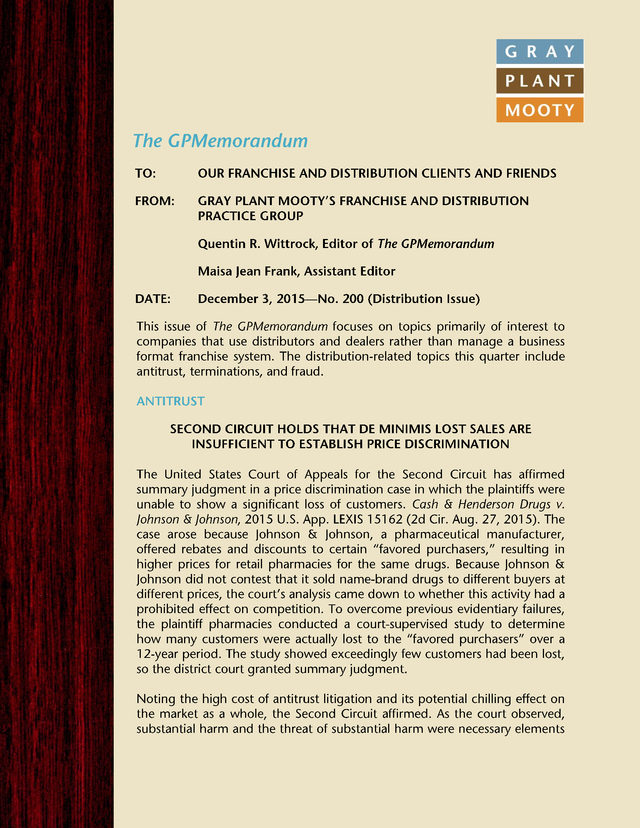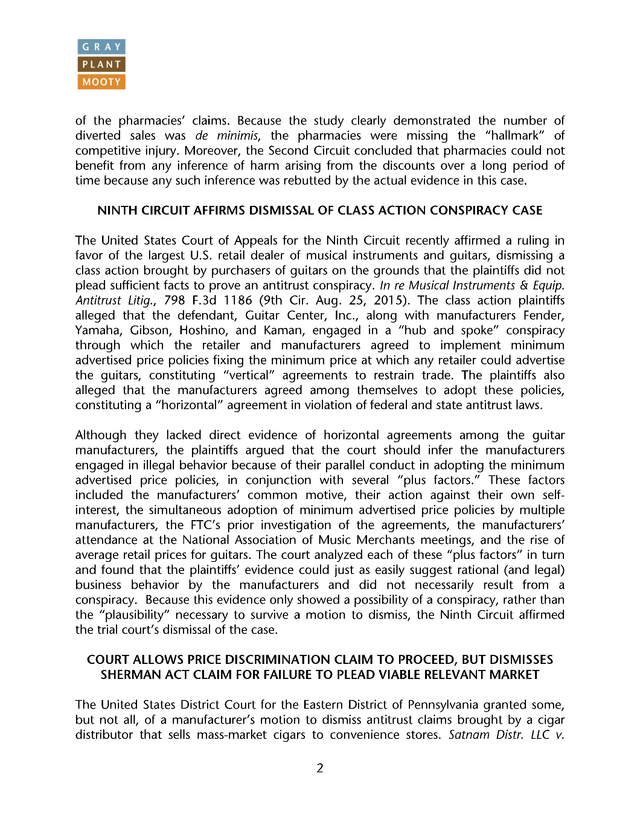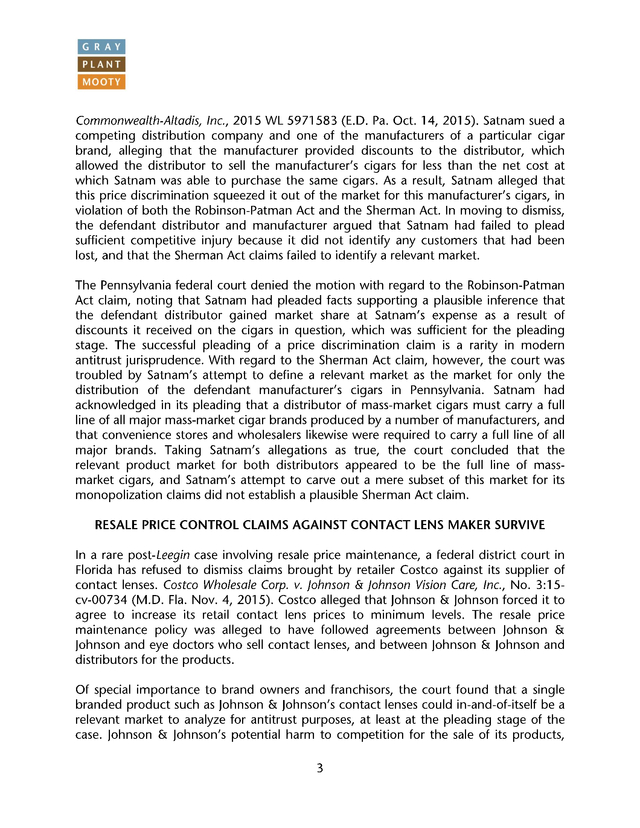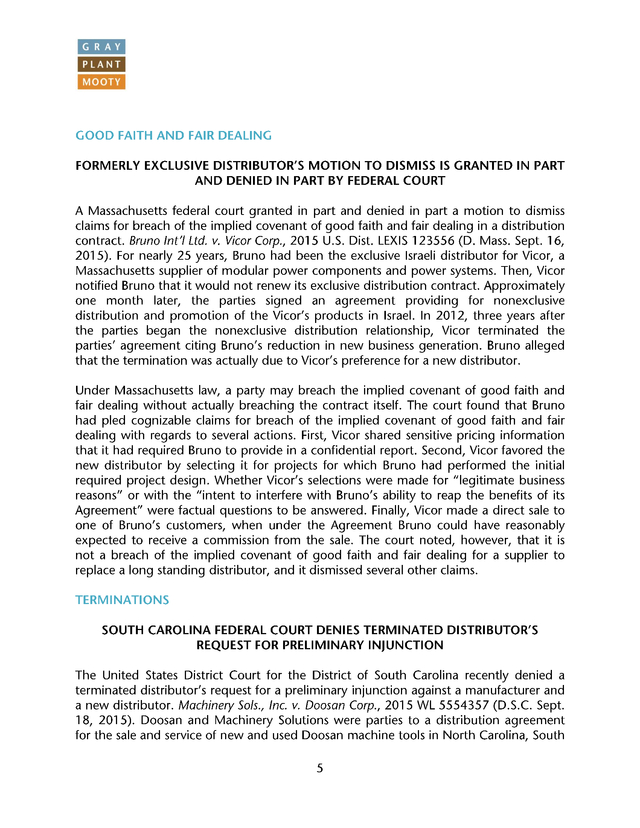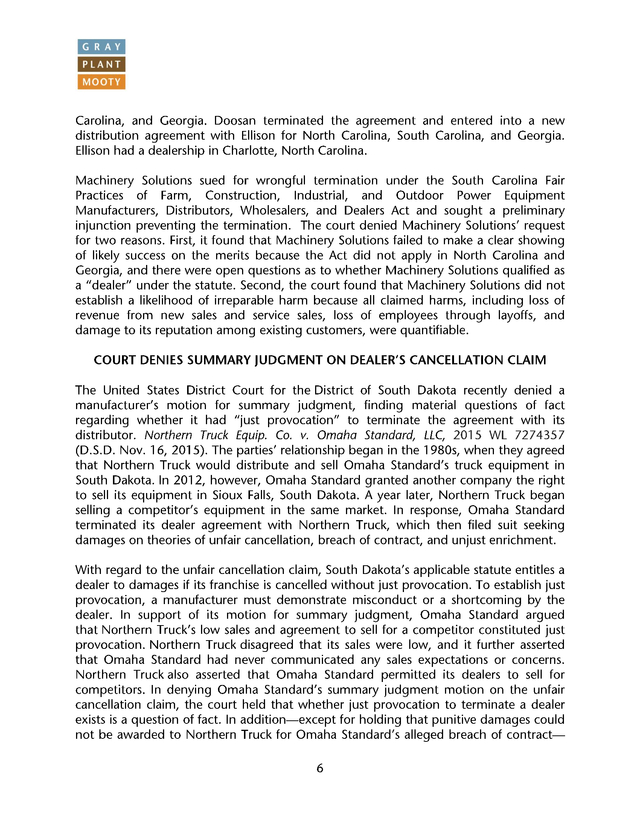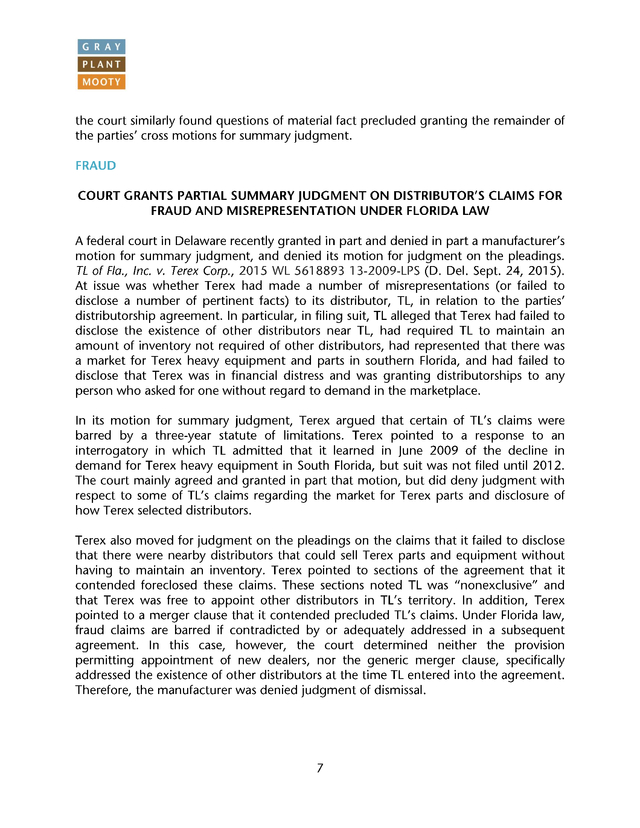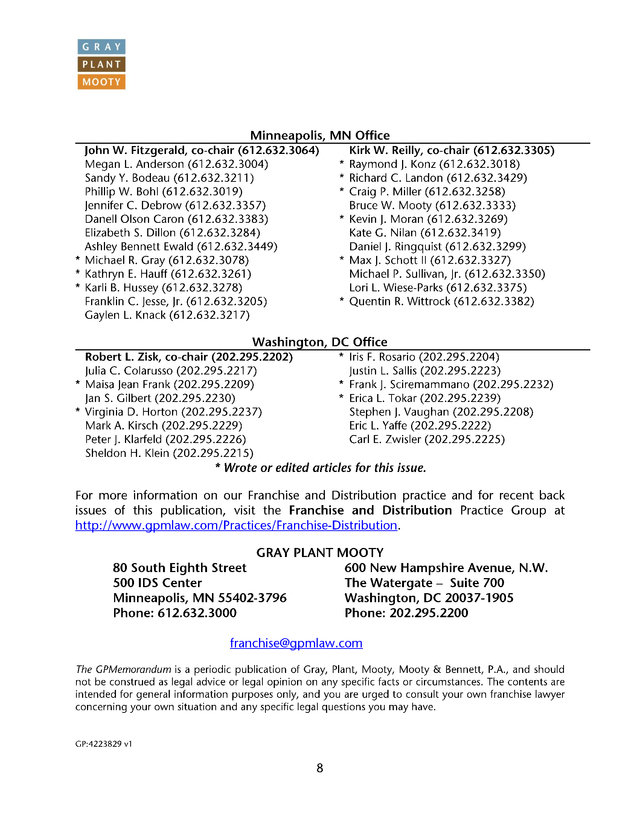Description
GRAY
PLANT
MOOTY
The GPMemorandum
TO:
OUR FRANCHISE AND DISTRIBUTION CLIENTS AND FRIENDS
FROM: GRAY PLANT MOOTY'S FRANCHISE AND DISTRIBUTION
PRACTICE GROUP
Quentin R. Wittrock, Editor of The GPMemorandum
Maisa Jean Frank, Assistant Editor
DATE:
December 3, 2015—No. 200 (Distribution Issue)
This issue of The GPMemorandum focuses on topics primarily of interest to
companies that use distributors and dealers rather than manage a business
format franchise system. The distribution-related topics this quarter include
antitrust, terminations, and fraud.
ANTITRUST
SECOND CIRCUIT HOLDS THAT DE MINIMIS LOST SALES ARE
INSUFFICIENT TO ESTABLISH PRICE DISCRIMINATION
The United States Court of Appeals for the Second Circuit has affirmed
summary judgment in a price discrimination case in which the plaintiffs were
unable to show a significant loss of customers.
Cash Sr Henderson Drugs v. Johnson & Johnson, 2015 U.S. App. LEXIS 15162 (2d Cir.
Aug. 27, 2015). The case arose because Johnson & Johnson, a pharmaceutical manufacturer, offered rebates and discounts to certain "favored purchasers," resulting in higher prices for retail pharmacies for the same drugs.
Because Johnson & Johnson did not contest that it sold name-brand drugs to different buyers at different prices, the court's analysis came down to whether this activity had a prohibited effect on competition. To overcome previous evidentiary failures, the plaintiff pharmacies conducted a court-supervised study to determine how many customers were actually lost to the "favored purchasers" over a 12-year period. The study showed exceedingly few customers had been lost, so the district court granted summary judgment. Noting the high cost of antitrust litigation and its potential chilling effect on the market as a whole, the Second Circuit affirmed.
As the court observed, substantial harm and the threat of substantial harm were necessary elements . GRAY PLANT MOOTY of the pharmacies' claims. Because the study clearly demonstrated the number of diverted sales was de minimis, the pharmacies were missing the "hallmark" of competitive injury. Moreover, the Second Circuit concluded that pharmacies could not benefit from any inference of harm arising from the discounts over a long period of time because any such inference was rebutted by the actual evidence in this case. NINTH CIRCUIT AFFIRMS DISMISSAL OF CLASS ACTION CONSPIRACY CASE The United States Court of Appeals for the Ninth Circuit recently affirmed a ruling in favor of the largest U.S. retail dealer of musical instruments and guitars, dismissing a class action brought by purchasers of guitars on the grounds that the plaintiffs did not plead sufficient facts to prove an antitrust conspiracy.
In re Musical Instruments & Equip. Antitrust Litig., 798 F.3d 1186 (9th Cir. Aug. 25, 2015).
The class action plaintiffs alleged that the defendant, Guitar Center, Inc., along with manufacturers Fender, Yamaha, Gibson, Hoshino, and Kaman, engaged in a "hub and spoke" conspiracy through which the retailer and manufacturers agreed to implement minimum advertised price policies fixing the minimum price at which any retailer could advertise the guitars, constituting "vertical" agreements to restrain trade. The plaintiffs also alleged that the manufacturers agreed among themselves to adopt these policies, constituting a "horizontal" agreement in violation of federal and state antitrust laws. Although they lacked direct evidence of horizontal agreements among the guitar manufacturers, the plaintiffs argued that the court should infer the manufacturers engaged in illegal behavior because of their parallel conduct in adopting the minimum advertised price policies, in conjunction with several "plus factors." These factors included the manufacturers' common motive, their action against their own selfinterest, the simultaneous adoption of minimum advertised price policies by multiple manufacturers, the FTC's prior investigation of the agreements, the manufacturers' attendance at the National Association of Music Merchants meetings, and the rise of average retail prices for guitars. The court analyzed each of these "plus factors" in turn and found that the plaintiffs' evidence could just as easily suggest rational (and legal) business behavior by the manufacturers and did not necessarily result from a conspiracy.
Because this evidence only showed a possibility of a conspiracy, rather than the "plausibility" necessary to survive a motion to dismiss, the Ninth Circuit affirmed the trial court's dismissal of the case. COURT ALLOWS PRICE DISCRIMINATION CLAIM TO PROCEED, BUT DISMISSES SHERMAN ACT CLAIM FOR FAILURE TO PLEAD VIABLE RELEVANT MARKET The United States District Court for the Eastern District of Pennsylvania granted some, but not all, of a manufacturer's motion to dismiss antitrust claims brought by a cigar distributor that sells mass-market cigars to convenience stores. Satnam Distr. LLC v. 2 .
GRAY PLANT MOOTY Commonwealth-Altadis, Inc., 2015 WL 5971583 (E.D. Pa. Oct. 14, 2015).
Satnam sued a competing distribution company and one of the manufacturers of a particular cigar brand, alleging that the manufacturer provided discounts to the distributor, which allowed the distributor to sell the manufacturer's cigars for less than the net cost at which Satnam was able to purchase the same cigars. As a result, Satnam alleged that this price discrimination squeezed it out of the market for this manufacturer's cigars, in violation of both the Robinson-Patman Act and the Sherman Act. In moving to dismiss, the defendant distributor and manufacturer argued that Satnam had failed to plead sufficient competitive injury because it did not identify any customers that had been lost, and that the Sherman Act claims failed to identify a relevant market. The Pennsylvania federal court denied the motion with regard to the Robinson-Patman Act claim, noting that Satnam had pleaded facts supporting a plausible inference that the defendant distributor gained market share at Satnam's expense as a result of discounts it received on the cigars in question, which was sufficient for the pleading stage.
The successful pleading of a price discrimination claim is a rarity in modern antitrust jurisprudence. With regard to the Sherman Act claim, however, the court was troubled by Satnam's attempt to define a relevant market as the market for only the distribution of the defendant manufacturer's cigars in Pennsylvania. Satnam had acknowledged in its pleading that a distributor of mass-market cigars must carry a full line of all major mass-market cigar brands produced by a number of manufacturers, and that convenience stores and wholesalers likewise were required to carry a full line of all major brands.
Taking Satnam's allegations as true, the court concluded that the relevant product market for both distributors appeared to be the full line of massmarket cigars, and Satnam's attempt to carve out a mere subset of this market for its monopolization claims did not establish a plausible Sherman Act claim. RESALE PRICE CONTROL CLAIMS AGAINST CONTACT LENS MAKER SURVIVE In a rare post-Leegin case involving resale price maintenance, a federal district court in Florida has refused to dismiss claims brought by retailer Costco against its supplier of contact lenses. Costco Wholesale Corp. v.
Johnson & Johnson Vision Care, Inc., No. 3:15cv-00734 (M.D. Fla.
Nov. 4, 2015). Costco alleged that Johnson & Johnson forced it to agree to increase its retail contact lens prices to minimum levels.
The resale price maintenance policy was alleged to have followed agreements between Johnson & Johnson and eye doctors who sell contact lenses, and between Johnson & Johnson and distributors for the products. Of special importance to brand owners and franchisors, the court found that a single branded product such as Johnson & Johnson's contact lenses could in-and-of-itself be a relevant market to analyze for antitrust purposes, at least at the pleading stage of the case. Johnson & Johnson's potential harm to competition for the sale of its products, 3 . GRAY PLANT MOOTY and in the broader contact lens market as a whole, was sufficient to create a claim under Section 1 of the Sherman Antitrust Act. (The court's decision applied a "Rule of Reason" standard for weighing the reasonableness of the manufacturer's required resale pricing agreements, as required under the U.S. Supreme Court's 2007 Leegin decision.) The court found it plausible that an agreement between Johnson & Johnson and eye doctors could have led to the resale price controls, along with Johnson & Johnson's alleged agreements with distributors. Moreover, even the agreement between Costco itself and Johnson & Johnson met the required element of concerted action in restraint of trade.
Despite its own acquiescence to the pricing controls, Costco—individually and on behalf of its customers/members—had sufficient "standing" to challenge Johnson & Johnson's pricing requirements. AVOIDING COLLUSION WITH COMPETITORS Collusion with competitors is the most serious form of antitrust risk. Bid rigging and price fixing, for example, are criminal offenses, and individuals receive prison sentences when they engage in such conduct on behalf of their companies. The problem is that it is difficult to tell where legal collaboration ends and collusion starts.
Trade association activity provides one case in point. While generally legal, trade associations can lead to competitors working together too closely and ending up in trouble. Worries also arise when competitors discuss a merger or acquisition: how soon can they start presenting a unified face to customers on central terms such as pricing and who deals with whom? What about bid situations? When a customer wants to use the manufacturer's product but needs multiple bids, what involvement can the manufacturer have in working with various potential bidding dealers, or in submitting a factory-direct bid itself? In addition, when a competitor is also your customer or supplier for certain components or in a particular geographic area, it is tricky to separate the cooperation needed in any buyerseller relationship from the collusion generally forbidden of competitors. The most common antitrust "collusion" problem for manufacturers arises not at the supplier level itself, but when independent dealers conspire among themselves to rig bids or fix prices, and then the dealers attempt to draw the manufacturer into their illegal arrangement.
In this scenario, some dealers may complain about other dealers, and may ask the manufacturer to "police" their anticompetitive agreement. They also may ask the manufacturer to participate directly by agreeing that its company-owned distribution outlets or direct sales activities will be curtailed to facilitate the dealers' arrangement. Vexing issues face the manufacturer who wants to do the right thing legally while seeing to it that its good dealers are profitable and happy. Our next Distribution Issue of The GPMemorandum will discuss ways for manufacturers and other companies to avoid antitrust liability for collusion, as well as the other risks discussed here and in Issue 196. 4 .
GRAY PLANT MOOTY GOOD FAITH AND FAIR DEALING FORMERLY EXCLUSIVE DISTRIBUTOR'S MOTION TO DISMISS IS GRANTED IN PART AND DENIED IN PART BY FEDERAL COURT A Massachusetts federal court granted in part and denied in part a motion to dismiss claims for breach of the implied covenant of good faith and fair dealing in a distribution contract. Bruno Int'l Ltd. v. Vicor Corp., 2015 U.S.
Dist. LEXIS 123556 (D. Mass.
Sept. 16, 2015). For nearly 25 years, Bruno had been the exclusive Israeli distributor for Vicor, a Massachusetts supplier of modular power components and power systems.
Then, Vicor notified Bruno that it would not renew its exclusive distribution contract. Approximately one month later, the parties signed an agreement providing for nonexclusive distribution and promotion of the Vicor's products in Israel. In 2012, three years after the parties began the nonexclusive distribution relationship, Vicor terminated the parties' agreement citing Bruno's reduction in new business generation.
Bruno alleged that the termination was actually due to Vicor's preference for a new distributor. Under Massachusetts law, a party may breach the implied covenant of good faith and fair dealing without actually breaching the contract itself. The court found that Bruno had pled cognizable claims for breach of the implied covenant of good faith and fair dealing with regards to several actions. First, Vicor shared sensitive pricing information that it had required Bruno to provide in a confidential report.
Second, Vicor favored the new distributor by selecting it for projects for which Bruno had performed the initial required project design. Whether Vicor's selections were made for "legitimate business reasons" or with the "intent to interfere with Bruno's ability to reap the benefits of its Agreement" were factual questions to be answered. Finally, Vicor made a direct sale to one of Bruno's customers, when under the Agreement Bruno could have reasonably expected to receive a commission from the sale.
The court noted, however, that it is not a breach of the implied covenant of good faith and fair dealing for a supplier to replace a long standing distributor, and it dismissed several other claims. TERMINATIONS SOUTH CAROLINA FEDERAL COURT DENIES TERMINATED DISTRIBUTOR'S REQUEST FOR PRELIMINARY INJUNCTION The United States District Court for the District of South Carolina recently denied a terminated distributor's request for a preliminary injunction against a manufacturer and a new distributor. Machinery SoIs., Inc. v.
Doosan Corp., 2015 WL 5554357 (D.S.C. Sept. 18, 2015). Doosan and Machinery Solutions were parties to a distribution agreement for the sale and service of new and used Doosan machine tools in North Carolina, South 5 .
GRAY PLANT MOOTY Carolina, and Georgia. Doosan terminated the agreement and entered into a new distribution agreement with Ellison for North Carolina, South Carolina, and Georgia. Ellison had a dealership in Charlotte, North Carolina. Machinery Solutions sued for wrongful termination under the South Carolina Fair Practices of Farm, Construction, Industrial, and Outdoor Power Equipment Manufacturers, Distributors, Wholesalers, and Dealers Act and sought a preliminary injunction preventing the termination. The court denied Machinery Solutions' request for two reasons. First, it found that Machinery Solutions failed to make a clear showing of likely success on the merits because the Act did not apply in North Carolina and Georgia, and there were open questions as to whether Machinery Solutions qualified as a "dealer" under the statute.
Second, the court found that Machinery Solutions did not establish a likelihood of irreparable harm because all claimed harms, including loss of revenue from new sales and service sales, loss of employees through layoffs, and damage to its reputation among existing customers, were quantifiable. COURT DENIES SUMMARY JUDGMENT ON DEALER'S CANCELLATION CLAIM The United States District Court for the District of South Dakota recently denied a manufacturer's motion for summary judgment, finding material questions of fact regarding whether it had "just provocation" to terminate the agreement with its distributor. Northern Truck Equip. Co.
v. Omaha Standard, LLC, 2015 WL 7274357 (D.S.D. Nov.
16, 2015). The parties' relationship began in the 1980s, when they agreed that Northern Truck would distribute and sell Omaha Standard's truck equipment in South Dakota. In 2012, however, Omaha Standard granted another company the right to sell its equipment in Sioux Falls, South Dakota.
A year later, Northern Truck began selling a competitor's equipment in the same market. In response, Omaha Standard terminated its dealer agreement with Northern Truck, which then filed suit seeking damages on theories of unfair cancellation, breach of contract, and unjust enrichment. With regard to the unfair cancellation claim, South Dakota's applicable statute entitles a dealer to damages if its franchise is cancelled without just provocation. To establish just provocation, a manufacturer must demonstrate misconduct or a shortcoming by the dealer.
In support of its motion for summary judgment, Omaha Standard argued that Northern Truck's low sales and agreement to sell for a competitor constituted just provocation. Northern Truck disagreed that its sales were low, and it further asserted that Omaha Standard had never communicated any sales expectations or concerns. Northern Truck also asserted that Omaha Standard permitted its dealers to sell for competitors. In denying Omaha Standard's summary judgment motion on the unfair cancellation claim, the court held that whether just provocation to terminate a dealer exists is a question of fact.
In addition—except for holding that punitive damages could not be awarded to Northern Truck for Omaha Standard's alleged breach of contract6 . GRAY PLANT MOOTY the court similarly found questions of material fact precluded granting the remainder of the parties' cross motions for summary judgment. FivAuu COURT GRANTS PARTIAL SUMMARY JUDGMENT ON DISTRIBUTOR'S CLAIMS FOR FRAUD AND MISREPRESENTATION UNDER FLORIDA LAW A federal court in Delaware recently granted in part and denied in part a manufacturer's motion for summary judgment, and denied its motion for judgment on the pleadings. TL of Fla., Inc. v. Terex Corp., 2015 WL 5618893 13-2009-LPS (D. Del.
Sept. 24, 2015). At issue was whether Terex had made a number of misrepresentations (or failed to disclose a number of pertinent facts) to its distributor, TL, in relation to the parties' distributorship agreement. In particular, in filing suit, TL alleged that Terex had failed to disclose the existence of other distributors near TL, had required TL to maintain an amount of inventory not required of other distributors, had represented that there was a market for Terex heavy equipment and parts in southern Florida, and had failed to disclose that Terex was in financial distress and was granting distributorships to any person who asked for one without regard to demand in the marketplace. In its motion for summary judgment, Terex argued that certain of TL's claims were barred by a three-year statute of limitations.
Terex pointed to a response to an interrogatory in which TL admitted that it learned in June 2009 of the decline in demand for Terex heavy equipment in South Florida, but suit was not filed until 2012. The court mainly agreed and granted in part that motion, but did deny judgment with respect to some of TL's claims regarding the market for Terex parts and disclosure of how Terex selected distributors. Terex also moved for judgment on the pleadings on the claims that it failed to disclose that there were nearby distributors that could sell Terex parts and equipment without having to maintain an inventory. Terex pointed to sections of the agreement that it contended foreclosed these claims. These sections noted TL was "nonexclusive" and that Terex was free to appoint other distributors in TL's territory.
In addition, Terex pointed to a merger clause that it contended precluded TL's claims. Under Florida law, fraud claims are barred if contradicted by or adequately addressed in a subsequent agreement. In this case, however, the court determined neither the provision permitting appointment of new dealers, nor the generic merger clause, specifically addressed the existence of other distributors at the time TL entered into the agreement. Therefore, the manufacturer was denied judgment of dismissal. 7 .
GRAY PLANT MOOTY Minneapolis, MN Office Kirk W. Reilly, co-chair (612.632.3305) John W. Fitzgerald, co-chair (612.632.3064) Megan L. Anderson (612.632.3004) * Raymond J.
Konz (612.632.3018) Sandy Y. Bodeau (612.632.3211) * Richard C. Landon (612.632.3429) Phillip W.
Bohl (612.632.3019) * Craig P. Miller (612.632.3258) Jennifer C. Debrow (612.632.3357) Bruce W.
Mooty (612.632.3333) Danell Olson Caron (612.632.3383) * Kevin J. Moran (612.632.3269) Elizabeth S. Dillon (612.632.3284) Kate G.
Nilan (612.632.3419) Ashley Bennett Ewald (612.632.3449) Daniel J. Ringquist (612.632.3299) * Michael R. Gray (612.632.3078) * Max J.
Schott II (612.632.3327) Michael P. Sullivan, Jr. (612.632.3350) * Kathryn E.
Hauff (612.632.3261) * Karli B. Hussey (612.632.3278) Lori L. Wiese-Parks (612.632.3375) Franklin C.
Jesse, Jr. (612.632.3205) * Quentin R. Wittrock (612.632.3382) Gaylen L.
Knack (612.632.3217) Washington, DC Office Robert L. Zisk, co-chair (202.295.2202) * Iris F. Rosario (202.295.2204) Julia C.
Colarusso (202.295.2217) Justin L. Sallis (202.295.2223) * Maisa Jean Frank (202.295.2209) * Frank J. Sciremammano (202.295.2232) * Erica L.
Tokar (202.295.2239) Jan S. Gilbert (202.295.2230) * Virginia D. Horton (202.295.2237) Stephen J.
Vaughan (202.295.2208) Mark A. Kirsch (202.295.2229) Eric L. Yaffe (202.295.2222) Carl E.
Zwisler (202.295.2225) Peter J. Klarfeld (202.295.2226) Sheldon H. Klein (202.295.2215) * Wrote or edited articles for this issue. For more information on our Franchise and Distribution practice and for recent back issues of this publication, visit the Franchise and Distribution Practice Group at http://www.gpmlaw.com/Practices/Franchise-Distribution. GRAY PLANT MOOTY 600 New Hampshire Avenue, N.W. 80 South Eighth Street 500 IDS Center The Watergate - Suite 700 Minneapolis, MN 55402-3796 Washington, DC 20037-1905 Phone: 612.632.3000 Phone: 202.295.2200 franchise@gpmlaw.com The GPMemorandum is a periodic publication of Gray, Plant, Mooty, Mooty & Bennett, P.A., and should not be construed as legal advice or legal opinion on any specific facts or circumstances.
The contents are intended for general information purposes only, and you are urged to consult your own franchise lawyer concerning your own situation and any specific legal questions you may have. GP:4223829 vl 8 .
Cash Sr Henderson Drugs v. Johnson & Johnson, 2015 U.S. App. LEXIS 15162 (2d Cir.
Aug. 27, 2015). The case arose because Johnson & Johnson, a pharmaceutical manufacturer, offered rebates and discounts to certain "favored purchasers," resulting in higher prices for retail pharmacies for the same drugs.
Because Johnson & Johnson did not contest that it sold name-brand drugs to different buyers at different prices, the court's analysis came down to whether this activity had a prohibited effect on competition. To overcome previous evidentiary failures, the plaintiff pharmacies conducted a court-supervised study to determine how many customers were actually lost to the "favored purchasers" over a 12-year period. The study showed exceedingly few customers had been lost, so the district court granted summary judgment. Noting the high cost of antitrust litigation and its potential chilling effect on the market as a whole, the Second Circuit affirmed.
As the court observed, substantial harm and the threat of substantial harm were necessary elements . GRAY PLANT MOOTY of the pharmacies' claims. Because the study clearly demonstrated the number of diverted sales was de minimis, the pharmacies were missing the "hallmark" of competitive injury. Moreover, the Second Circuit concluded that pharmacies could not benefit from any inference of harm arising from the discounts over a long period of time because any such inference was rebutted by the actual evidence in this case. NINTH CIRCUIT AFFIRMS DISMISSAL OF CLASS ACTION CONSPIRACY CASE The United States Court of Appeals for the Ninth Circuit recently affirmed a ruling in favor of the largest U.S. retail dealer of musical instruments and guitars, dismissing a class action brought by purchasers of guitars on the grounds that the plaintiffs did not plead sufficient facts to prove an antitrust conspiracy.
In re Musical Instruments & Equip. Antitrust Litig., 798 F.3d 1186 (9th Cir. Aug. 25, 2015).
The class action plaintiffs alleged that the defendant, Guitar Center, Inc., along with manufacturers Fender, Yamaha, Gibson, Hoshino, and Kaman, engaged in a "hub and spoke" conspiracy through which the retailer and manufacturers agreed to implement minimum advertised price policies fixing the minimum price at which any retailer could advertise the guitars, constituting "vertical" agreements to restrain trade. The plaintiffs also alleged that the manufacturers agreed among themselves to adopt these policies, constituting a "horizontal" agreement in violation of federal and state antitrust laws. Although they lacked direct evidence of horizontal agreements among the guitar manufacturers, the plaintiffs argued that the court should infer the manufacturers engaged in illegal behavior because of their parallel conduct in adopting the minimum advertised price policies, in conjunction with several "plus factors." These factors included the manufacturers' common motive, their action against their own selfinterest, the simultaneous adoption of minimum advertised price policies by multiple manufacturers, the FTC's prior investigation of the agreements, the manufacturers' attendance at the National Association of Music Merchants meetings, and the rise of average retail prices for guitars. The court analyzed each of these "plus factors" in turn and found that the plaintiffs' evidence could just as easily suggest rational (and legal) business behavior by the manufacturers and did not necessarily result from a conspiracy.
Because this evidence only showed a possibility of a conspiracy, rather than the "plausibility" necessary to survive a motion to dismiss, the Ninth Circuit affirmed the trial court's dismissal of the case. COURT ALLOWS PRICE DISCRIMINATION CLAIM TO PROCEED, BUT DISMISSES SHERMAN ACT CLAIM FOR FAILURE TO PLEAD VIABLE RELEVANT MARKET The United States District Court for the Eastern District of Pennsylvania granted some, but not all, of a manufacturer's motion to dismiss antitrust claims brought by a cigar distributor that sells mass-market cigars to convenience stores. Satnam Distr. LLC v. 2 .
GRAY PLANT MOOTY Commonwealth-Altadis, Inc., 2015 WL 5971583 (E.D. Pa. Oct. 14, 2015).
Satnam sued a competing distribution company and one of the manufacturers of a particular cigar brand, alleging that the manufacturer provided discounts to the distributor, which allowed the distributor to sell the manufacturer's cigars for less than the net cost at which Satnam was able to purchase the same cigars. As a result, Satnam alleged that this price discrimination squeezed it out of the market for this manufacturer's cigars, in violation of both the Robinson-Patman Act and the Sherman Act. In moving to dismiss, the defendant distributor and manufacturer argued that Satnam had failed to plead sufficient competitive injury because it did not identify any customers that had been lost, and that the Sherman Act claims failed to identify a relevant market. The Pennsylvania federal court denied the motion with regard to the Robinson-Patman Act claim, noting that Satnam had pleaded facts supporting a plausible inference that the defendant distributor gained market share at Satnam's expense as a result of discounts it received on the cigars in question, which was sufficient for the pleading stage.
The successful pleading of a price discrimination claim is a rarity in modern antitrust jurisprudence. With regard to the Sherman Act claim, however, the court was troubled by Satnam's attempt to define a relevant market as the market for only the distribution of the defendant manufacturer's cigars in Pennsylvania. Satnam had acknowledged in its pleading that a distributor of mass-market cigars must carry a full line of all major mass-market cigar brands produced by a number of manufacturers, and that convenience stores and wholesalers likewise were required to carry a full line of all major brands.
Taking Satnam's allegations as true, the court concluded that the relevant product market for both distributors appeared to be the full line of massmarket cigars, and Satnam's attempt to carve out a mere subset of this market for its monopolization claims did not establish a plausible Sherman Act claim. RESALE PRICE CONTROL CLAIMS AGAINST CONTACT LENS MAKER SURVIVE In a rare post-Leegin case involving resale price maintenance, a federal district court in Florida has refused to dismiss claims brought by retailer Costco against its supplier of contact lenses. Costco Wholesale Corp. v.
Johnson & Johnson Vision Care, Inc., No. 3:15cv-00734 (M.D. Fla.
Nov. 4, 2015). Costco alleged that Johnson & Johnson forced it to agree to increase its retail contact lens prices to minimum levels.
The resale price maintenance policy was alleged to have followed agreements between Johnson & Johnson and eye doctors who sell contact lenses, and between Johnson & Johnson and distributors for the products. Of special importance to brand owners and franchisors, the court found that a single branded product such as Johnson & Johnson's contact lenses could in-and-of-itself be a relevant market to analyze for antitrust purposes, at least at the pleading stage of the case. Johnson & Johnson's potential harm to competition for the sale of its products, 3 . GRAY PLANT MOOTY and in the broader contact lens market as a whole, was sufficient to create a claim under Section 1 of the Sherman Antitrust Act. (The court's decision applied a "Rule of Reason" standard for weighing the reasonableness of the manufacturer's required resale pricing agreements, as required under the U.S. Supreme Court's 2007 Leegin decision.) The court found it plausible that an agreement between Johnson & Johnson and eye doctors could have led to the resale price controls, along with Johnson & Johnson's alleged agreements with distributors. Moreover, even the agreement between Costco itself and Johnson & Johnson met the required element of concerted action in restraint of trade.
Despite its own acquiescence to the pricing controls, Costco—individually and on behalf of its customers/members—had sufficient "standing" to challenge Johnson & Johnson's pricing requirements. AVOIDING COLLUSION WITH COMPETITORS Collusion with competitors is the most serious form of antitrust risk. Bid rigging and price fixing, for example, are criminal offenses, and individuals receive prison sentences when they engage in such conduct on behalf of their companies. The problem is that it is difficult to tell where legal collaboration ends and collusion starts.
Trade association activity provides one case in point. While generally legal, trade associations can lead to competitors working together too closely and ending up in trouble. Worries also arise when competitors discuss a merger or acquisition: how soon can they start presenting a unified face to customers on central terms such as pricing and who deals with whom? What about bid situations? When a customer wants to use the manufacturer's product but needs multiple bids, what involvement can the manufacturer have in working with various potential bidding dealers, or in submitting a factory-direct bid itself? In addition, when a competitor is also your customer or supplier for certain components or in a particular geographic area, it is tricky to separate the cooperation needed in any buyerseller relationship from the collusion generally forbidden of competitors. The most common antitrust "collusion" problem for manufacturers arises not at the supplier level itself, but when independent dealers conspire among themselves to rig bids or fix prices, and then the dealers attempt to draw the manufacturer into their illegal arrangement.
In this scenario, some dealers may complain about other dealers, and may ask the manufacturer to "police" their anticompetitive agreement. They also may ask the manufacturer to participate directly by agreeing that its company-owned distribution outlets or direct sales activities will be curtailed to facilitate the dealers' arrangement. Vexing issues face the manufacturer who wants to do the right thing legally while seeing to it that its good dealers are profitable and happy. Our next Distribution Issue of The GPMemorandum will discuss ways for manufacturers and other companies to avoid antitrust liability for collusion, as well as the other risks discussed here and in Issue 196. 4 .
GRAY PLANT MOOTY GOOD FAITH AND FAIR DEALING FORMERLY EXCLUSIVE DISTRIBUTOR'S MOTION TO DISMISS IS GRANTED IN PART AND DENIED IN PART BY FEDERAL COURT A Massachusetts federal court granted in part and denied in part a motion to dismiss claims for breach of the implied covenant of good faith and fair dealing in a distribution contract. Bruno Int'l Ltd. v. Vicor Corp., 2015 U.S.
Dist. LEXIS 123556 (D. Mass.
Sept. 16, 2015). For nearly 25 years, Bruno had been the exclusive Israeli distributor for Vicor, a Massachusetts supplier of modular power components and power systems.
Then, Vicor notified Bruno that it would not renew its exclusive distribution contract. Approximately one month later, the parties signed an agreement providing for nonexclusive distribution and promotion of the Vicor's products in Israel. In 2012, three years after the parties began the nonexclusive distribution relationship, Vicor terminated the parties' agreement citing Bruno's reduction in new business generation.
Bruno alleged that the termination was actually due to Vicor's preference for a new distributor. Under Massachusetts law, a party may breach the implied covenant of good faith and fair dealing without actually breaching the contract itself. The court found that Bruno had pled cognizable claims for breach of the implied covenant of good faith and fair dealing with regards to several actions. First, Vicor shared sensitive pricing information that it had required Bruno to provide in a confidential report.
Second, Vicor favored the new distributor by selecting it for projects for which Bruno had performed the initial required project design. Whether Vicor's selections were made for "legitimate business reasons" or with the "intent to interfere with Bruno's ability to reap the benefits of its Agreement" were factual questions to be answered. Finally, Vicor made a direct sale to one of Bruno's customers, when under the Agreement Bruno could have reasonably expected to receive a commission from the sale.
The court noted, however, that it is not a breach of the implied covenant of good faith and fair dealing for a supplier to replace a long standing distributor, and it dismissed several other claims. TERMINATIONS SOUTH CAROLINA FEDERAL COURT DENIES TERMINATED DISTRIBUTOR'S REQUEST FOR PRELIMINARY INJUNCTION The United States District Court for the District of South Carolina recently denied a terminated distributor's request for a preliminary injunction against a manufacturer and a new distributor. Machinery SoIs., Inc. v.
Doosan Corp., 2015 WL 5554357 (D.S.C. Sept. 18, 2015). Doosan and Machinery Solutions were parties to a distribution agreement for the sale and service of new and used Doosan machine tools in North Carolina, South 5 .
GRAY PLANT MOOTY Carolina, and Georgia. Doosan terminated the agreement and entered into a new distribution agreement with Ellison for North Carolina, South Carolina, and Georgia. Ellison had a dealership in Charlotte, North Carolina. Machinery Solutions sued for wrongful termination under the South Carolina Fair Practices of Farm, Construction, Industrial, and Outdoor Power Equipment Manufacturers, Distributors, Wholesalers, and Dealers Act and sought a preliminary injunction preventing the termination. The court denied Machinery Solutions' request for two reasons. First, it found that Machinery Solutions failed to make a clear showing of likely success on the merits because the Act did not apply in North Carolina and Georgia, and there were open questions as to whether Machinery Solutions qualified as a "dealer" under the statute.
Second, the court found that Machinery Solutions did not establish a likelihood of irreparable harm because all claimed harms, including loss of revenue from new sales and service sales, loss of employees through layoffs, and damage to its reputation among existing customers, were quantifiable. COURT DENIES SUMMARY JUDGMENT ON DEALER'S CANCELLATION CLAIM The United States District Court for the District of South Dakota recently denied a manufacturer's motion for summary judgment, finding material questions of fact regarding whether it had "just provocation" to terminate the agreement with its distributor. Northern Truck Equip. Co.
v. Omaha Standard, LLC, 2015 WL 7274357 (D.S.D. Nov.
16, 2015). The parties' relationship began in the 1980s, when they agreed that Northern Truck would distribute and sell Omaha Standard's truck equipment in South Dakota. In 2012, however, Omaha Standard granted another company the right to sell its equipment in Sioux Falls, South Dakota.
A year later, Northern Truck began selling a competitor's equipment in the same market. In response, Omaha Standard terminated its dealer agreement with Northern Truck, which then filed suit seeking damages on theories of unfair cancellation, breach of contract, and unjust enrichment. With regard to the unfair cancellation claim, South Dakota's applicable statute entitles a dealer to damages if its franchise is cancelled without just provocation. To establish just provocation, a manufacturer must demonstrate misconduct or a shortcoming by the dealer.
In support of its motion for summary judgment, Omaha Standard argued that Northern Truck's low sales and agreement to sell for a competitor constituted just provocation. Northern Truck disagreed that its sales were low, and it further asserted that Omaha Standard had never communicated any sales expectations or concerns. Northern Truck also asserted that Omaha Standard permitted its dealers to sell for competitors. In denying Omaha Standard's summary judgment motion on the unfair cancellation claim, the court held that whether just provocation to terminate a dealer exists is a question of fact.
In addition—except for holding that punitive damages could not be awarded to Northern Truck for Omaha Standard's alleged breach of contract6 . GRAY PLANT MOOTY the court similarly found questions of material fact precluded granting the remainder of the parties' cross motions for summary judgment. FivAuu COURT GRANTS PARTIAL SUMMARY JUDGMENT ON DISTRIBUTOR'S CLAIMS FOR FRAUD AND MISREPRESENTATION UNDER FLORIDA LAW A federal court in Delaware recently granted in part and denied in part a manufacturer's motion for summary judgment, and denied its motion for judgment on the pleadings. TL of Fla., Inc. v. Terex Corp., 2015 WL 5618893 13-2009-LPS (D. Del.
Sept. 24, 2015). At issue was whether Terex had made a number of misrepresentations (or failed to disclose a number of pertinent facts) to its distributor, TL, in relation to the parties' distributorship agreement. In particular, in filing suit, TL alleged that Terex had failed to disclose the existence of other distributors near TL, had required TL to maintain an amount of inventory not required of other distributors, had represented that there was a market for Terex heavy equipment and parts in southern Florida, and had failed to disclose that Terex was in financial distress and was granting distributorships to any person who asked for one without regard to demand in the marketplace. In its motion for summary judgment, Terex argued that certain of TL's claims were barred by a three-year statute of limitations.
Terex pointed to a response to an interrogatory in which TL admitted that it learned in June 2009 of the decline in demand for Terex heavy equipment in South Florida, but suit was not filed until 2012. The court mainly agreed and granted in part that motion, but did deny judgment with respect to some of TL's claims regarding the market for Terex parts and disclosure of how Terex selected distributors. Terex also moved for judgment on the pleadings on the claims that it failed to disclose that there were nearby distributors that could sell Terex parts and equipment without having to maintain an inventory. Terex pointed to sections of the agreement that it contended foreclosed these claims. These sections noted TL was "nonexclusive" and that Terex was free to appoint other distributors in TL's territory.
In addition, Terex pointed to a merger clause that it contended precluded TL's claims. Under Florida law, fraud claims are barred if contradicted by or adequately addressed in a subsequent agreement. In this case, however, the court determined neither the provision permitting appointment of new dealers, nor the generic merger clause, specifically addressed the existence of other distributors at the time TL entered into the agreement. Therefore, the manufacturer was denied judgment of dismissal. 7 .
GRAY PLANT MOOTY Minneapolis, MN Office Kirk W. Reilly, co-chair (612.632.3305) John W. Fitzgerald, co-chair (612.632.3064) Megan L. Anderson (612.632.3004) * Raymond J.
Konz (612.632.3018) Sandy Y. Bodeau (612.632.3211) * Richard C. Landon (612.632.3429) Phillip W.
Bohl (612.632.3019) * Craig P. Miller (612.632.3258) Jennifer C. Debrow (612.632.3357) Bruce W.
Mooty (612.632.3333) Danell Olson Caron (612.632.3383) * Kevin J. Moran (612.632.3269) Elizabeth S. Dillon (612.632.3284) Kate G.
Nilan (612.632.3419) Ashley Bennett Ewald (612.632.3449) Daniel J. Ringquist (612.632.3299) * Michael R. Gray (612.632.3078) * Max J.
Schott II (612.632.3327) Michael P. Sullivan, Jr. (612.632.3350) * Kathryn E.
Hauff (612.632.3261) * Karli B. Hussey (612.632.3278) Lori L. Wiese-Parks (612.632.3375) Franklin C.
Jesse, Jr. (612.632.3205) * Quentin R. Wittrock (612.632.3382) Gaylen L.
Knack (612.632.3217) Washington, DC Office Robert L. Zisk, co-chair (202.295.2202) * Iris F. Rosario (202.295.2204) Julia C.
Colarusso (202.295.2217) Justin L. Sallis (202.295.2223) * Maisa Jean Frank (202.295.2209) * Frank J. Sciremammano (202.295.2232) * Erica L.
Tokar (202.295.2239) Jan S. Gilbert (202.295.2230) * Virginia D. Horton (202.295.2237) Stephen J.
Vaughan (202.295.2208) Mark A. Kirsch (202.295.2229) Eric L. Yaffe (202.295.2222) Carl E.
Zwisler (202.295.2225) Peter J. Klarfeld (202.295.2226) Sheldon H. Klein (202.295.2215) * Wrote or edited articles for this issue. For more information on our Franchise and Distribution practice and for recent back issues of this publication, visit the Franchise and Distribution Practice Group at http://www.gpmlaw.com/Practices/Franchise-Distribution. GRAY PLANT MOOTY 600 New Hampshire Avenue, N.W. 80 South Eighth Street 500 IDS Center The Watergate - Suite 700 Minneapolis, MN 55402-3796 Washington, DC 20037-1905 Phone: 612.632.3000 Phone: 202.295.2200 franchise@gpmlaw.com The GPMemorandum is a periodic publication of Gray, Plant, Mooty, Mooty & Bennett, P.A., and should not be construed as legal advice or legal opinion on any specific facts or circumstances.
The contents are intended for general information purposes only, and you are urged to consult your own franchise lawyer concerning your own situation and any specific legal questions you may have. GP:4223829 vl 8 .



